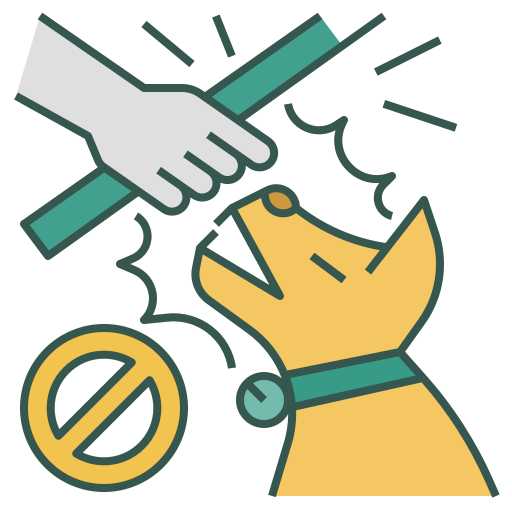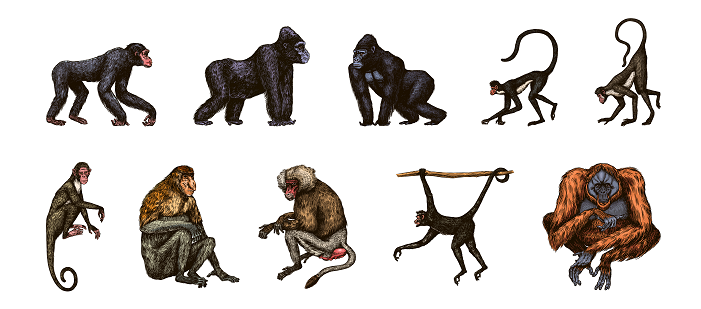Part A Vocabulary
Learn the vocabulary and idioms related to the topic, and describe the picture.

Part A_1 Vocabulary
We’ll read aloud the words and expressions below. Please repeat after me. I will check your pronunciation.
(Please send the mispronounced words and expressions to your student.)
講師の真似をして単語を発音しましょう。
Part A_2 Vocabulary

|
chimpanzee
チンパンジー
|

|
observe
観察する
|
|
behavior
行動、態度、ふるまい
|
|

|
childhood
幼年時代、幼時
|

|
cruel
残酷な、冷酷な
|
|
patrol
巡察、パトロール
|


Part A_3 Vocabulary
Now, let’s review some words from part A_2.
(Please review the mispronounced words and expressions from part A_2.)
復習しましょう。
Part A_4 Vocabulary


Part A_5 Picture description
Now, please look at the picture below. Give three actions that you see in the picture.
以下の写真を見てください。3人の人物が何をしているか描写してみましょう。

Part A_6 Picture description

Part A_7 Picture description
| 1. | |
| 2. | |
| 3. |


Part A_8 Picture description
Now, let’s review your answers.
Please review your student’s answers by sending the correct answers in complete sentences. After that, ask your student to read aloud his or her corrected answers.)
復習しましょう。
Part A_9 Picture description

Part B Passage reading
Read sentences and check your pronunciation. Make sure you understand the content.

Part B_1 Passage reading
You will read aloud the passage below. I will check your pronunciation and intonation.
(Please send the mispronounced words and expressions to your student.)
文章を読みましょう。
Part B_2 Passage reading
Roots & Shoots
Jane Goodall is famous for her work on chimpanzees. She decided to go to Africa after reading Doctor Dolittle and Tarzan’s books. When she was 11 years old, she knew she would somehow end up in Africa to live with animals, study them, and publish books about them. To understand animals, Goodall advises us to watch and observe their behavior. She also said, “It is important that you take notes and ask questions.”
Chimpanzees and humans have a lot in common. They learn much in their childhood like us, and chimp families are very close, often helping one another. They can also feel sad, happy, afraid, and angry.
Chimpanzees are generally friendly, but they can be cruel. For example, the males patrol their territories, sometimes attacking chimps from another community. However, they are also capable of showing compassion. A three-year-old chimp named Mel lost his mother and was left all alone, but a 12-year-old male chimp named Spindle took care of him. “He let him ride on his back and share his nest at night.”


Part B_3 Passage reading
Now, let’s review some words and sentences from part B_2.
(Please review the mispronounced words and sentences from part B_2.)
復習しましょう。
Part B_4 Passage reading


Part B_5 Comprehension questions
I will ask the following questions. Please answer based on the passage. I will check if your sentences are complete and if the grammar is correct.
講師が以下の質問をします。読んだ内容をもとに答えましょう。

Part B_6 Comprehension questions
| 1. | How can we understand animals, according to Goodall? |
Part B_7 Comprehension questions
| Answer: |


Part B_8 Comprehension questions
| 2. | What would male chimpanzees do while patrolling their territories? |
Part B_9 Comprehension questions
| Answer: |


Part B_10 Comprehension questions
| 3. | Who is Spindle and what did he do? |
Part B_11 Comprehension questions
| Answer: |


Part B_12 Comprehension questions
Now, let’s review your answers.
(Please review your student’s answers by sending the correct answers in complete sentences. After that, ask your student to read aloud his or her corrected answers.)
復習しましょう。
Part B_13 Comprehension questions

Part C Fill in the blanks
Fill in the blanks with the correct words/phrases to complete the sentences.

Part C_1 Fill in the blanks
Please choose a word/phrase to complete each sentence. Then, read aloud the sentences.
言葉を選んで文章を完成させましょう。そのあと音読しましょう。
Part C_2 Fill in the blanks

behavior
childhood
patrol
| 1. | She has loved dancing since ___________. |
| 2. | Anna has a good ___________ towards the elderly. |
| 3. | The police regularly ___________ the area. |


Part C_3 Fill in the blanks
Now, let’s review your answers.
(Please review your student’s answers by sending the correct answers in complete sentences. After that, ask your student to read aloud his or her corrected answers.)
復習しましょう。
Part C_4 Fill in the blanks

Part D Q&A
Answer the questions and check your grammar. Make sure you understand the content.

Part D_1 Q&A
Please answer the following questions. I will check if your sentences are complete and if the grammar is correct.
講師が質問しますので答えましょう。


Part D_2 Q&A
| 1. | Do you like animals? |
Part D_3 Q&A
| Answer: |


Part D_4 Q&A
| 2. | What image do you have of chimpanzees? |
Part D_5 Q&A
| Answer: |


Part D_6 Q&A
| 3. | Do you have a pet? What animals do you want to have as a pet? |
Part D_7 Q&A
| Answer: |


Part D_8 Q&A
| 4. | Do you want to be able to talk to animals? If you could talk to animals, what would you say to them? |
Part D_9 Q&A
| Answer: |


Part D_10 Q&A
Now, let’s review your answers.
(Please review your student’s answers by sending the correct answers in complete sentences. After that, ask your student to read aloud his or her corrected answers.)
復習しましょう。
Part D_11 Q&A

Part E Free talk
Talk about the following topics.

Part E_1 Free talk
Let’s do a free talk about the following topics.
(Please do a free talk if you have time left.)
フリートークをしましょう。

Part E_2 Free talk
| 1. | In your opinion, what are the similarities between humans and chimpanzees? |
Part E_3 Free talk
| Answer: |


Part E_4 Free talk
| 2. | Do you like going to the zoo? When you go to the zoo, what animals do you always see? Why? |
Part E_5 Free talk
| Answer: |
